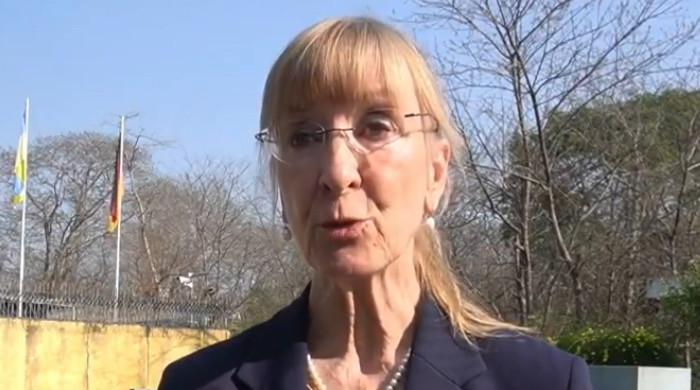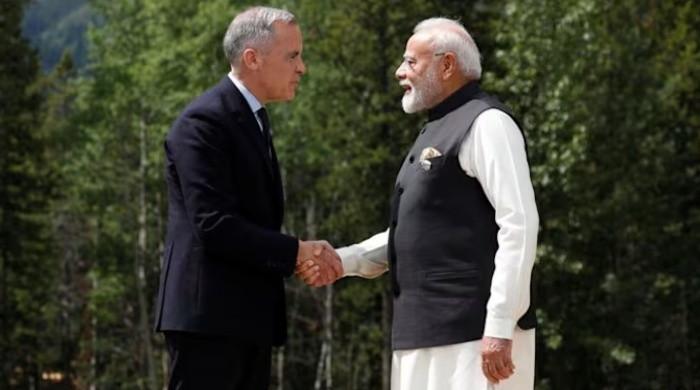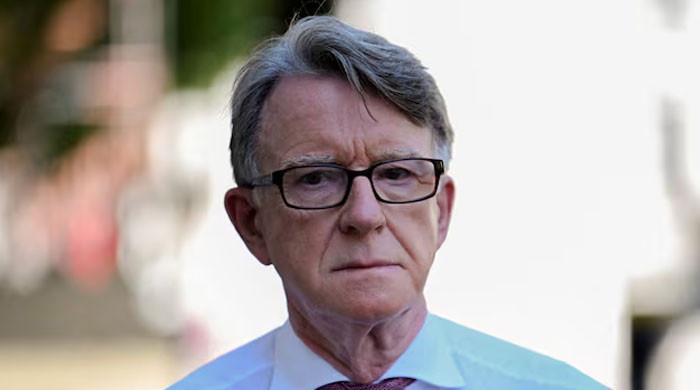British PM faces "tsunami" of recession, Murdoch
LONDON: Prime Minister David Cameron endured the worst day of his premiership on Wednesday after Britain slipped back into recession and he was forced to defend a minister alleged to have colluded...
April 26, 2012
News that Britain's $2.5 trillion economy fell into recession in the first quarter crowned weeks of blunders over tax changes that forced a member of his own party to dismiss him as an "arrogant posh boy."
Facing at least partial failure on his declared priority of nursing Britain back to economic health, Cameron's links with the world's most powerful media tycoon were placed under renewed scrutiny after disclosures that a minister colluded with News Corp over a planned $12 billion takeover.
Such was the drama of a tumultuous day in which Cameron's roaring answers at parliamentary questions on the economy and on Murdoch were drowned out by jeering, that some spoke of a tidal wave engulfing the government.
"It's more like a tsunami. I don't think it's a perfect storm, it's a bloody tsunami with no tsunami warning," lawmaker Mike Hancock, a member of the Liberal Democrats, the partner of the Conservatives in the coalition, told Reuters.
"We've got here because ... there is a failure of anyone in the senior echelons in government to have any real political nous at all. Their advisers are obviously lacking in it as well."
Hancock said the fallout could undermine the coalition's prospects at local elections on May 3, an important gauge of the mood of the country and how it might vote in the next parliamentary election in 2015.
For Cameron, there could hardly be worse timing for Wednesday's economic data which showed Britain's gross domestic product fell 0.2 percent in the first quarter of 2012 on top of a 0.3 percent decline at the end of 2011.
Most economists had expected Britain's economy to eke out modest growth in early 2012, but these forecasts were upset by the biggest fall in construction output in three years, coupled with a slump in Britain's prized financial services sector and the oil and gas industry.
THE ECONOMY STUPID
A contracting economy means Cameron and his finance minister, George Osborne, will find it much harder to reduce the budget deficit, the main pledge of the coalition government when it came to power in May 2010.
If they are seen to have failed to reduce the deficit, which peaked at over 11 percent of gross domestic product in 2009-2010, then they could face trouble in 2015.
"We expect the economy will continue to underperform, given the headwinds from fiscal drag, high household debts, the EMU crisis and poor credit availability," Citi economist Michael Saunders said in a research note to clients.
Gilt prices rallied and sterling fell more than half a cent against the dollar after the data.
The government's austerity plan rests on growth forecasts of 0.8 percent this year and 2.0 percent in 2013, though most forecasts were based on the assumption of a modest rebound in the first quarter of 2012.
That bodes badly for ministers telling voters that Britain is a safe-haven island of economic prudence compared to the profligate euro zone which is mired in a debt crisis.
"These are very, very disappointing figures," Cameron told parliament. "There is no complacency at all in this government in dealing with what is a very tough situation that frankly has just got tougher."
Opposition Labour leader Ed Miliband, whose own weak leadership has helped give Cameron's government an easy ride so far, tried to play on Cameron's privileged background, calling the prime minister an arrogant posh boy mired in sleaze.
Miliband, who has found some traction with voters for his tough stance on the Murdoch scandal, teased Cameron with evidence released at an inquiry into media ethics, showing one of his ministers may have colluded with News Corp over its planned $12 billion takeover of BSkyB (BSY.L).
MURDOCH
Culture secretary Jeremy Hunt, previously seen as a rising star in the Conservative Party, has denied giving Murdoch special access but his special adviser, Adam Smith, resigned on Wednesday.
Grilled for hours by one of London's top lawyers, Murdoch rejected accusations that he used his media empire to play puppet master to a succession of British prime ministers.
But Conservative lawmakers told Reuters the inquiry had angered the media, including Murdoch's influential Sun newspaper, the country's biggest daily by circulation.
"To battle hardened pros like myself it isn't a huge surprise that they've taken a more critical tone and of course it is uncomfortable for the prime minister," said lawmaker David Ruffley.
"It's not the greatest thing to wake up every morning to criticism ranging from the economy to the prime minister's visit to Burma and everything else in between."
Murdoch, 81, was asked about his relationship to politics and British "toffs", a reference to his regular attacks on Britain's gilded establishment, which the Australian-born tycoon has lampooned as snobbish and inefficient.
Some politicians had expected the magnate - courted by prime ministers and presidents for decades - to come out fighting, having been on the back foot for almost a year over a newspaper phone hacking scandal that has convulsed his empire.
But Murdoch appeared laconic, dismissing Cameron in just three words. Asked if as reported he had initially found Cameron to be lightweight, Murdoch replied: "No. Not then." (Reuters)











